
To get the best results when selling your business, you’ll need to enlist the aid of qualified professionals. In this episode, we’ll drill into the importance of establishing a trusted team to handle your transaction before you go to market. We’ll also talk about the concept of teamwork within the team and the difference this can make when done well and when it’s done poorly.

Episode Highlights:
- A successful transaction requires an expert team
- Form your transaction team before going to market
- Find the right professionals to help you
- Accountants should be careful with valuations
- Tax expertise can save you money
- Understand the extent of interaction within the team
Joanna: Hi, it’s Joanna Oakey here and welcome back to The Deal Room podcast brought to you by our commercial practice, Aspect Legal.
Now today we have on board Peter Wallace from Endeavor Capital and we’re going to talk about the concept of transaction advisors working together. We’re going to talk a little bit about each of our experiences when this is done well and when it’s done poorly.
I think this is particularly useful. I think most of our listening audience are you know either businesses who are looking to buy or sell, but also professional advisors so accountants, M&A advisors, brokers and I think this discussion could be really useful in giving each of us as professionals a little bit of insight into how it feels to sit on the other side of the table and what some of the things are that we might be doing and not realising that are causing barriers to the process.
So Peter, welcome on board. I think this is going to be a ripper of an episode.
Peter: Hi Joanna. I hope to be a value adder.
Joanna: All right so Peter, how about we start off by if you can give us a really quick overview of who you are and where you come from and what you do.
Peter: Okay. So I’m Peter Wallace. I’m the Managing Director of Endeavor Capital. We’re a lower mid-market corporate advisory group, so business sales, business acquisitions, business valuations.
We also get involved with exit planning and corporate governance reviews. So we’ve got a kind of a broader mandate than just purely a transactional mandate.
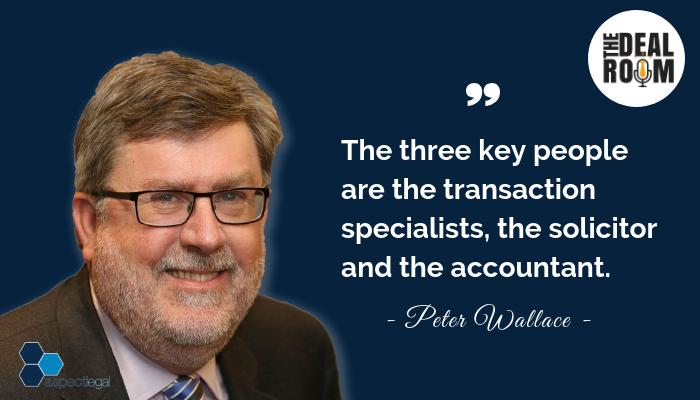
A successful transaction requires an expert team
Joanna: And so then, talking about this issue of transaction advisors working together maybe let’s kick it off. Why do you think this is an important topic for us to be talking about?
Peter: Well, our clients don’t buy and sell businesses for a living. As a generalisation, they might only buy or sell one business in their lifetime and so therefore a successful transaction will need a transactional specialist whether that’s the corporate adviser or business broker. You’ll need a solicitor. You’ll probably need an external accountant.
If extended to exit planning, well there will be some work involved in getting the business ready for exit. That might involve some coaching skills so that’s done by the corporate adviser or done by the accountant or done by an external business coach. Then the ultimate thing, the financial planning aspirations of the client and so financial planner might be involved and so there certainly is a spot.
The broader exit planning has got more components to it than a business acquisition or sale. But if you look at just an acquisition or sale, the three key people are the transaction specialists, the solicitor and the accountant.
We all have to work together to achieve an outcome for the client, whether that’s a successful transaction or not. Well, it depends on the circumstances. But it works well when we work together.
Joanna: Yeah, I completely agree. And I’m really glad to be talking about this topic because my approach has always been that we get better outcomes when we’re all working together. But it’s interesting how many advisors are used to working in their silos. I think that’s, perhaps from my perspective, problem number one.
Peter: Absolutely. Part of what we need to do is to understand how what we do is dependent on other people and how other people are dependent on us. Front of mind is the objective of the client. We need to understand what each of us does so that we can better serve our client.
Joanna: Yeah. It’s interesting as well because I guess from a client’s perspective, they are coming into a transaction quite often having to tell the story to their M&A advisor or their broker and then tell the story to their lawyer and tell the story to their accountant. In a perfect world, we will all be there together wouldn’t we? In working through it so the story doesn’t have to be told multiple times.
Peter: Well, that’s right and I would encourage anybody that is considering selling their business to put their transaction team together early so that we can actually understand each other, know who’s on the team, know what they’re good at, know if there’s any weaknesses and how we can cover any of those weaknesses. So there is only one story.
Then when we go to the market, the deal is ready to go. It’s polished. There’s no skeletons. If we have somebody interested in buying it, he can progress smoothly to a positive conclusion.
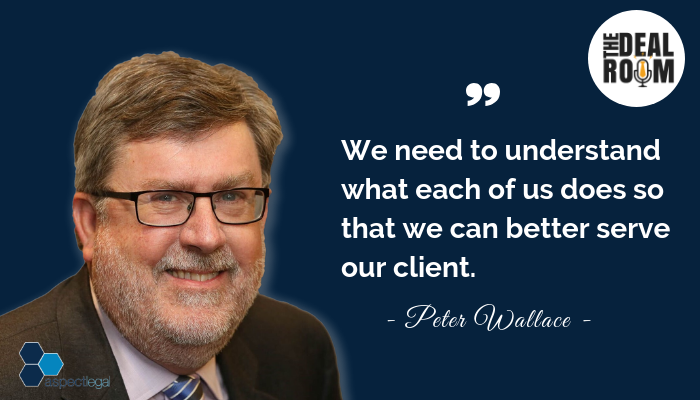
Form your transaction team before going to market
Joanna: Yeah, absolutely. Absolutely. Maybe if we kick it off, let’s start sharing some stories together because I think you know it’s quite useful to have actual real examples for people to hear of the pains from both of our sides that can be caused when the professional teams, the transaction team doesn’t work together.
I’ll kick it off. Something that happens very regularly from my perspective is that we, quite often we’re referred into a business purchase or sale at the time when commercial terms have already been arrived at. Because we do a lot of work in this area, they’re not necessarily clients. They’re not always clients that we’ve worked with beforehand. We come in at the time of the transaction.
What quite often happens that I see is the structure of the sale has been set up in such a way that is not necessarily conducive to the best outcome at the end of the day for the seller. By that, one classic example that I’m thinking of at the moment that has happened again and again and again and again for me is that an advisor or a broker has picked up a business who has spoken very briefly with their accountant about readying them for sale. They put the company on the market for sale, but they’re selling the business that’s held by company. We get to a sale position. It comes to our legal team and then suddenly we look at it and we say okay well do you realise you’ll have tax issues here that potentially could have been minimised if you had approached the sale in a slightly different way from a legal and accounting perspective.
And usually it’s too late by then. Right? We can’t go and restructure the business. We can’t go and restructure the sale. Sometimes we can, but usually once everyone’s got in their mind what the commercial terms are it’s very hard to push say for example a share sale rather than a business sale at that point because of where we’ve come in.
And so from my perspective advisers working together to the best benefit of the client also happens a few steps earlier in the preparation of the business for sale so that that business owner is structured in the right way and the advisors have been able to impart the information to the broker or the M&A adviser, so they know the best outcome of sale for that business owner. So that they end up with the most amount of money in their pocket at the end of the day.
From my perspective, that’s the thing that I see happen quite often and certainly something that I believe could be resolved by transaction teams working together early in the process before it hits the market.
Peter: Absolutely. We’ve had similar sort of situations where we’ve had discussions on whether it’s a sale of business or sale of shares. I’ve had one example where, because I’ve had too many times it’s a question I ask early. I ask the accountant early if it was a transaction, what’s the best way to do it. They said “x”, got to the addressed and they said oh no it’s the other way.
Joanna: Yes. I’ve seen that.
Peter: Definitely that’s one that as part of kind of a preparation process is that the objective isn’t to maximise the sale price. It’s to maximise the after tax sale price.
Joanna: That’s exactly right. You know what, I feel in the industry as a whole though, it’s probably well known between accountants and lawyers. But I think for brokers and M&A advisors, perhaps it’s not as clear what massive implications they can be between a business sale and a share sale in some instances.
I certainly know many brokers who approach it from all share sales too hard because no one likes to buy shares. But in my view that’s absolutely rubbish. You can get over that if you need to. But firstly everyone needs to understand what the most optimal thing looks like and then you can find a way to build that into the sale.
Peter: Yeah, and I think it’s also a function of the size of business. I think the sort of transactions we do they’re mostly share sales. The bigger you get, the more likely it is to be share sale. I mean I can’t think of a business sale that I’ve done where the price was say more than 2 million dollars.
I mean they’re all share sale. At the small end, I think there is going to be more company sales than in the past for a couple reasons. One, and this may be a topic for you for another podcast, is that the privacy rules on selling a business, about information on clients you can and can’t pass across on a sale of business as opposed to a sale of shares. Stating our difference, still you need a tenth of a tax than it is. Obviously, it is more advantageous to sell shares rather than business in that situation.
Joanna: Yeah. So I guess firstly, so what we’re talking about here then, bringing you back to the transaction advisers working together. It’s about so maybe number one it’s an education process. It’s about transaction advisers getting to know each other. But also working with the business early enough so that that can help pitch the deal in the right way I guess for the right outcome, which as you said is not necessarily top line price. But what’s in the vendor’s pockets, the seller’s pockets.
Peter: Yeah. I think the important thing is momentum. If you’ve got a buyer that’s interested in buying the business, you want to drive that to completion in a sensible time.
I mean they’ve got to do their due diligence and all that. But you don’t want deal fatigue to happen where we’re chopping and changing deals, not providing information. That way kind of preparation where before we go to market the three key professionals get together, work out if there are any points we need to address before we go to market. Certainly tax structuring is one of them.
Joanna: Look let’s also talk then about what other examples you’ve seen over time of issues caused by transaction teams not working together.
Peter: The biggest frustration is probably responsiveness. I guess you know if we’ve got a buyer wanting to buy a business, we want to get it done as quickly as possible.
This first one isn’t mine, but it was told me. It took a solicitor six months to get an assignment lease. The probability of a deal blowing up in that situation is high. Although I was involved, it was a relatively simple transaction. It was a sale of business. It took this solicitor two months to prepare a standard of NSW law society standard business sale contract.
Joanna: That’s an example don’t you think then of a solicitor that’s doing something they don’t know how to do or there’s something else going on there that’s something that should take a day to get out.
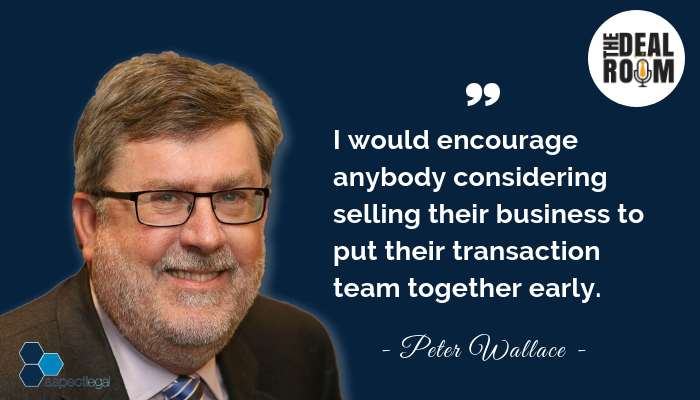
Find the right professionals to help you
Peter: That probably leads me to the second biggest bugbear is capability where the accountant and the solicitor usually have got a longer term relationship with the client than what we do. We come in there and go “Oh, I’m not sure they’re actually good enough.”.
It’s actually quite an awkward conversation to have with our client to say “Look, your accountant or your lawyer may be good at X Y and Z, but they’re actually not up to doing a transaction of this size and complexity.”
Joanna: The reality is that business sales and acquisitions are actually a very different area of law to many areas of even other general areas of commercial law. Certainly I’ve seen the instance many times of lawyers perhaps who have more of a bent towards litigation as an example. Becoming overly aggressive in a deal rather than having their head around what the real commercial outcomes and the real commercial risks are. Because I think in these sorts of transactions many things can look like a risk, but at the end of the day you need to have your commercial head on to really understand what really are true and foreseeable risks that need dealing with and what the appropriate way is to deal with those.
Peter: Again the larger the transaction, the less likely that’s going to be an issue because larger companies and larger businesses typically have got a different type of accounting and solicitor working with them.
But where I find it is probably kind of a in size businesses which are used to share sales of a size kind of one to four million dollars. So that it’s kind of a small deal for a big firm, but it’s a big deal for a small firm and sometimes that’s an area where there’s a fair bit of challenge in terms of how good people are.
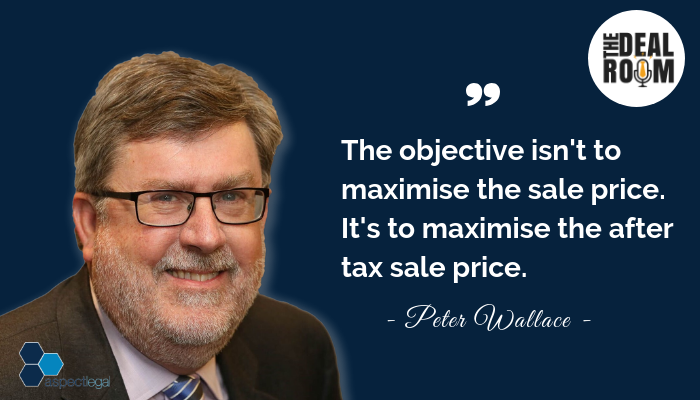
Accountants should be careful with valuations
Joanna: And let’s talk about the accountants side then as well. What are some of the issues that you have seen working with accountants and how can our accountants identify ways that they might be being obstructionist to the process.
Peter: The biggest one is before it goes to market, is to identify their client base that are baby boomers that may well be selling their business. The accountants are in an ideal position to have a conversation with their clients about well what’s the plan. Are they going to sell the business internally? Are they going to sell it externally? Are they going to pass it to the next generation? And is business in shape so it can be sold? So that’s kind of the first part.
The second part is well, what’s a realistic price for it? The joke with corporate advisors is the phrase you don’t want to hear is my accountant says my business is worth X, because X is usually way over the mark. Then you’ve got a situation where the vendors got high expectations supported by an accountant, but not supported by market evidence.
We have to deal with professional embarrassment with the accountant to say “Look, there’s no way it’ll sell for that because of”, and then we produce market evidence. Then there’s some conflict there. And so I guess my take out to the accountants is, if you’re not a business valuation expert, be very careful about what you say to clients about what you think the business might be worth.
Joanna: Yeah. This message has sort of been a bit of a theme in many of our podcasts because I think it’s quite a common issue that brokers and corporate advisors have to deal with, the rebalancing of their client’s expectations after they’ve had a prior discussion with their accountant about value.
This might in some ways be a bit confronting for accountants but I think on the one hand they might feel that there’s an expectation from their clients that because their accountants and they deal with numbers, they deal with businesses they should be able to provide a guide as to valuation. What’s the sort of things that you’d say about that?
What is it that an approach to valuation that has been used by accountants that you think maybe is what contributes to leading to this perhaps development of across the board an ongoing example of incorrect valuation?
Peter: An example that I had was this guy approached me to sell his business because he told his wife he was going to sell his business when he turned 65. The challenge was that it was in the depths of the GFC. He said his accountant told him his business was worth five times multiple.
I asked the obvious question can I have a copy of the valuation so I can understand it. No, he didn’t put it in writing. So tip number one for accountants, if you’re not willing to put it in writing, don’t say it.
With this guy, either the accountant or the vendor had completely misinterpreted the calculation to get from a multiple to an equity value where he’d ignored debt, he’d used the wrong multipole, he’d used the wrong income figure. He thought he was going to walk away with about three times as much as what he end up getting because of confusion somewhere along the way.
I wasn’t close enough to be able to point the finger at anybody. But there was certainly confusion between what the client thought the accountant said and reality.
Joanna: I guess you’re the one that has to have these difficult discussions to bring the sellers back to the reality of what they’re actually going to be able to get.
Peter: Yeah, that’s right. If the account is sufficiently experienced and expert in valuations, we’ll periodically do a most probable selling price estimate for the client and put it in writing so they understand what the drivers are and what are the earnings, what’s a multiple, what they actually get for it, how do we have to deal with debt, what are the tax implications. And so, the client will know what their walk away after tax figure is. Frequently, that’s a lot different to what I thought.
Peter: Then the accountant or they can get us involved, and we can say well how do we increase that after tax amount to an acceptable figure whether the quality of the business, reducing the risk, increasing profitability, better working capital management, all those sort of explaining issues as well as tax planning issues.
Joanna: Maybe in this all is an opportunity for accountants as well. Obviously, an opportunity for accountants who want to be a little bit more proactive perhaps in having these discussions with their client perhaps across the board. Because they may not necessarily know who’s about to want to walk into selling a business because there’s all sorts of drivers for selling a business that may just pop up. I guess as we always say it’s best for business owners to be running their businesses in a sale ready state always.
So you know maybe there’s an opportunity for accountants in proactively looking at valuations and how their clients can improve valuations so that they are running in a sale ready state. For those accountants who aren’t necessarily experienced in dealing with a particular client in various industry sectors in helping them arrive at valuations, what’s the path that you would recommend to them?
Peter: Well I think the first thing is to be very careful about what they’ve given them because in most cases it actually won’t be a formal valuation. Some of the audience will know APES 225, which is the valuation standard for accountants. Unfortunately, a lot of accountants don’t actually know that exists, and so they call things by the wrong name and set up expectations with their clients about calling something that isn’t a valuation a valuation.
That’s why there’s a phrase within APES 225 about most probable selling price estimate. It isn’t a valuation but it uses valuation techniques and so it’s a high level overview rather than the litigation type.
Joanna: Maybe if you could give us any examples if you have any of where this has worked really well. If you worked with any clients in the past where they thought about this early enough that they’ve considered getting a valuation of the business or an estimate on sale, but then looked at what element they could change to get a better valuation at the end or better sale outcome at the end of the day and then they’ve gone ahead in time and gotten a great sale.
Peter: We’ve got what we call a “know and grow your business value” sort of approach. So the first part is to deliver the reality pill that at the moment this is probably what you’d get for selling your business, which is usually a bit of a shock. Then it’s working with the client and say well, here are the barriers. Here are the things that are dropping down the value of the business and you need to address.
In simple terms, valuation is only about four factors – earnings, growth, risk and capital management. And so therefore, you look at earnings – how are we going to increase the earnings? How are you going to reduce the risk? Because the lower the risk the higher the multiple. The higher the growth in earnings the higher the multiple.
Then you look at working capital management – do they have a tight balance sheet? Have they got too money tied up in receivables and inventory? Because it’s usually not one thing, but it’s an exponential thing where if you fix this fix this fix is fix this, you can double the value of business within three years.
Joanna: Do you have any actual examples? I just love hearing you know the actual type of industry and what they did.
Peter: I have one where it was a business in the station business and we worked out that the industry was going through a change. We didn’t make a lot of money, so the business wasn’t make a lot of money. But we saw there was an opportunity to grow the business and we knew exactly who was going to buy it, why they’re going to buy it. We ended up, in that case, the value of the business increased by about five fold within three and a half years.
Interestingly, the earnings didn’t increase. Because usually, if you’re growing that fast, earnings tend to lag growth in revenue because you’re reinvesting. But the purchaser saw a great opportunity and the owner made four and half times in money in three years.
Joanna: What were the biggest changes they made in that time that created that result?
Peter: Well, I think it’s a combination of things. One is they worked out who is going to buy the business and what they wanted to buy.
There was part of the business that wasn’t relevant to the people that were likely to buy. There’s probably only three or four people that we thought would pay more than fair market value for the business because there were strategic reasons for them to do it.
We recognised their strategic reasons and we focused on making us more relevant to potential buyers. We got rid of noise. Closed one division down. We sold something else off. We made some acquisitions to make us more attractive in different markets, different geographic markets. So somebody came along and said you’re perfect for us. Here’s a ridiculously high price and we said thank you very much.
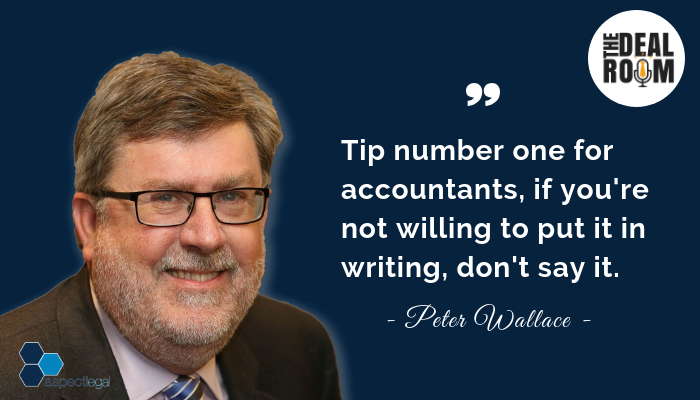
Tax expertise can save you money
Joanna: That’s fabulous. I guess coming full circle, we started off talking about transaction teams working together and the different advisors working together. Was there anything in that matter where you sort of drew on the expertise of other advisors in helping to get that outcome?
Peter: Well I think that certainly early on we worked out what the best tax position was and so we had to do some restructuring there from a tax perspective. The lawyers and the accountants did their job there in terms of making sure that it was a tax efficient transaction.
I guess the take out for that part of it is that we have stamp duty exemptions and capital gains tax exemptions and things like that. You need to do it sufficiently far before the transaction to make it effective otherwise it won’t work. And so that was one.
In that case, we had a good relationship with the external accountant where they were providing some of the coaching sort of advisory work and we were in there as a just as a high level overview in terms of here’s what we think should happen. The management team together with the external accountant and a few consultants drove it.
Joanna: Obviously, the advisory team working together and also another critical element is getting in early. Clearly, something that you did in this particular matter because you were talking about having enough time to restructure, having enough time to drive these changes such that they would have enough of a difference at the point of sale.
Peter: Markets change and if you’re not as you said sale ready all the time. If you can say you’re going to sell at a particular date and that’s not a convenient time because we’ve had a GFC or the stock market crash or whatever, then you have to be in a position where you’ve sufficiently flexible to be able to modify the timing without having fixed dates and fixed outcomes.
Joanna: It’s interesting, isn’t it? I think you know I sort of I always say a sale ready business is a nicer business to run anyway. Quite often they’re the business that they don’t necessarily feel they need to sell.
Peter: I had one guy who was going through the process and he started down the “I want to sell my business” and so, I told him what it was worth. Then I got him to think about here’s some things you can do to increase the value of a business. And he said, if I could do that, I wouldn’t sell the business. My answer was of course, “Good. Let’s solve those issues so that you don’t have to sell the business.”
Cause a lot of time, they’ve had a lousy couple of weeks where they have been dragged all over the place and they said “I’m going to sell the business.”.
They’re probably not likely to get a good result because the issues that were causing them frustration the potential buyer will see. But if we address those issues, often times they’re freed up so that it’s a case of helping the management, the owner develop a management team around him to take those annoying things off him.
Joanna: Yeah, really good point. And so, as we wind up this discussion are there a list of pointers that you could set out for our accountants and our corporate advisors or our brokers and our lawyers out there. I know there’s a few of them tuning in to listen to this podcast as well. Have you got any general tips on how to kick off working better together as a team and where are those key points are for identifying times too particularly work together as a team.
Peter: I think that’s very early on. As you said, before we go to market so that we’ve identified any particular tax issues or risk issues that we need to address before we go to market.
It’s a good way for us to, because I may or may not know the accountant or the lawyer. They may or may not know me. Therefore, understanding each other, understanding each other’s capabilities, understanding who’s responsible for what, who’s going to do what by when. So that get in early, address any issues and then keep each other updated.
As you said in the intro, we’re all so focused on what we’re doing. We do get stuck in silos and forgetting that we do have flow on effects to other people and that most of the time if we’re having regular updates, we can overcome those issues before they blow out of all proportion because momentum is probably the biggest thing. And if we can give in early, momentum is more likely to occur.
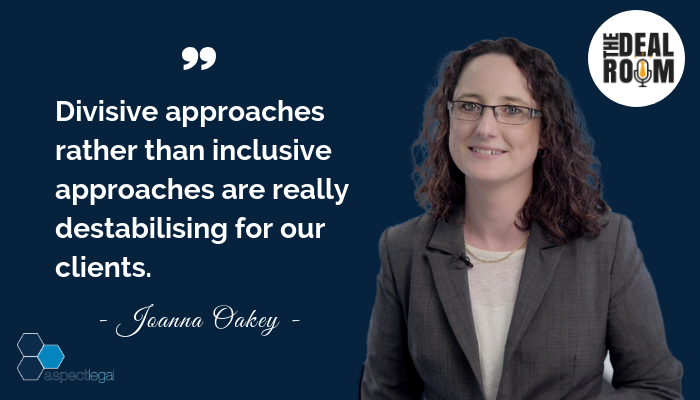
Understand the extent of interaction within the team
Joanna: Absolutely, absolutely. I think the other thing we haven’t talked about is sort of gauging where that line is in terms of the amount of interaction between the team. And what I mean by that is let’s talk about corporate advisers or brokers. Sometimes, and each person has a different approach, some approach advisors is about wanting to be really close to the transaction so they can help guide the transaction along. Be involved where there’s any issues. Help to deal with any issues. Some transaction advisors actually prefer to be somewhat removed from the transaction as well.
So I think part of the team working together is also about asking those questions at the beginning and understanding how involved each team member is. I guess, talking about accountants, some accountants are very very integrated in the business. If the broker or adviser doesn’t fully get that, there can be this turf war.
Peter: Absolutely.
Joanna: I’ve seen this happen quite a few times. It results in a really bad outcome for the clients I think. So I think it’s really important to be aware of that and to set the scene early.
Peter: Yeah. I have to admit I’m probably one of those ones who’s guilty about being a control freak.
My role is to help project management and so therefore, to project management, I need to understand what is happening.
I don’t want to step on people’s toes. But I need to understand what’s happening, what are the barriers. I mean it’s an emotional time for somebody who say selling the business. It’s an emotional time for them. There will be times where they will blow up and they’ll need to have their dummy-spit and facilitate a role where they can dummy-spit to me and I can make it more euphemistic when I talk to the other side.
Joanna: What I’ve seen what can really make the issue worse, the dummy-spit worse is when advisers then start to maybe bad mouth the other advisers. Perhaps even unintentionally. But come from the position of I think I would have done it this way rather than that way.
I think divisive approaches rather than inclusive approaches are really destabilising for our clients at the end of the day you know.
Peter: There’s no black and white way of doing it so that there are situations where I’ve said hands off approach, there’s (more often than not) I’ve got a hands on approach. It depends on the course and depending on the solicitor and accountant, if I’ve worked before I know where their strengths. I just let them do it because that’s what they are good at. Other times where there might be an area that I’m not convinced they’re strong on, well I might get a little bit more involved.
But ego’s a funny. We need to work with people. And so, working out the best way to work together.
Joanna: Absolutely, I completely agree. Well look hopefully this has been quite a useful episode for our listeners whatever space they are coming from. I found it very interesting. So look, thank you so much Peter for coming along and chatting to us today.
Peter: My pleasure.
Joanna: If our listeners want to make contact with you, how do they do that?
Peter: Okay, well the easiest way is to have a go at our website EndeavorCapital.com.au. Give me a call 04 1845 4144 or email [email protected].
Joanna: Excellent. Okay, wonderful. Well look, thanks Peter! Thanks for coming in to chat to us today and I think we’ll have you back for a future episode so we can drill into some of these areas in a little bit deeper detail. But until then, have a fabulous day.
Peter: Great! Thanks.
Joanna: That ends this episode with Peter Wallace of Endeavor Capital. Today’s episode was all about the team of professionals working together to get your business sale transaction across the line, and the importance of firstly, forming the team before you go to market so that all key advisors can work together to get the business in a sale-ready state.
Then Peter tacked the concept of capability. As I mentioned earlier, business sale and acquisitions is a specialised area. You need advisors who are experts in this particular area and who have had a wealth of experience in working through sales and acquisitions many times over. And here at Aspect Legal, awe absolutely agree with that point of view – we have seen first hand the issues that can be caused when advisors are acting on the other side of the table who don’t regularly work in this area – we’ve seen many deals get close to falling over just because of a lack of experience in what is actually quite a niche space.
And finally, we talked teamwork between advisors and the difference it can make when it’s done well and when it’s done poorly.
If you want to learn more from Peter, check out our show notes at www.thedealroompodcast.com where we’ll link through to their website. There you will also find a full transcript of this episode if you want to read it in more detail.
I hope you enjoyed today’s episode. If you did, please subscribe to The Deal Room on Apple Podcast or your other favorite podcast player.
Thanks again for listening in! This has been Joanna Oakey and The Deal Room Podcast, a podcast proudly brought to you by our commercial legal practice, Aspect Legal. See you next time!
Our Business Sales and Acquisitions Services
Aspect Legal has a number of great services that help businesses prepare for a sale or acquisition to help them prepare in advance and to get transaction ready. And we’ve also got a range of services to help guide businesses through the sale and acquisitions process.
We work with clients both big and small and have different types of services depending on size and complexity. We provide a free consultation to discuss your proposed sale or acquisition – so see our show notes on how to book a time to speak with us, or head over to our website at Aspectlegal.com.au
Disclaimer: The material contained on this website is provided for general information purposes only and does not constitute legal advice. You should not depend upon any information appearing on this website without seeking legal advice. We do not guarantee that the contents of this website will be accurate, complete or up-to-date. Liability limited by a scheme approved under Professional Standards Legislation














